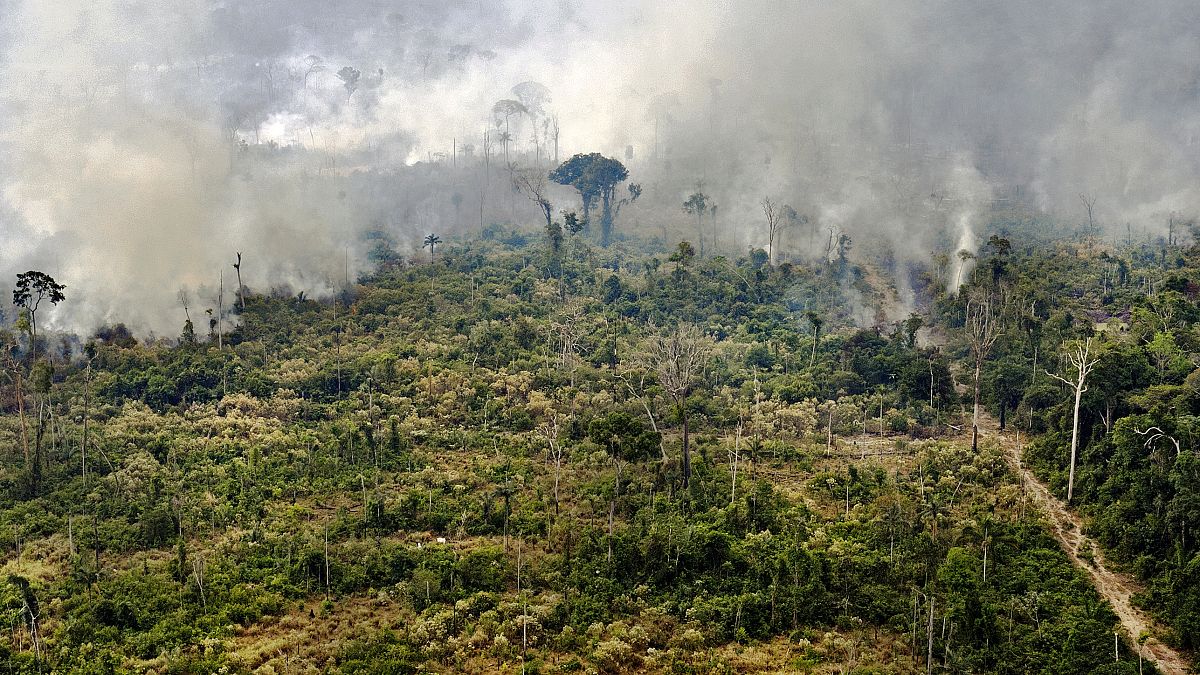By 2030, tropical forests may stop become a carbon sink and turn into carbon sources
Tropical forests are losing their ability to absorb carbon dioxide from the atmosphere and could even release more carbon into the air as soon as the next decade, new research has found.
The forests' growing inability to act as "carbon sinks", by taking up CO2 from the air, could precipitate a dire climate crisis.
The carbon sink strength of the world’s two most extensive tropical forests, the African and Amazonian tropical forests, "has now saturated". So says the study, which tracked 300,000 trees in 565 tropical forests over 30 years.
This is due to aggressive logging and farming as well as impacts of climate change, such as more frequent droughts and forest fires, which slow growth and kill trees.
'Nature switching from slowing climate change to accelerating it'
By 2030, these tropical forests may stop become a carbon sink and turn into carbon sources.
Study lead author Dr Wannes Hubau, a former post-doctoral researcher at the University of Leeds now based at the Royal Museum for Central Africa in Belgium, said that the current situation is "quite dramatic" and that there is no time to lose.
"One big concern for the future of humanity is when carbon-cycle feedbacks really kick in, with nature switching from slowing climate change to accelerating it", the study's author warned in a press release.
"Our modelling of these factors shows a long-term future decline in the African sink and that the Amazonian sink will continue to rapidly weaken, which we predict to become a carbon source in the mid-2030s", Hubau told Euronews.
World may enter 'vicious circle'
The study's projections for as soon as 2035 are bleak.
"The Amazon's carbon sink will completely disappear by 2035, reaching zero and potentially below zero", Hubau says.
At this point, the Amazon would release more carbon in the air than it removes.
The African tropical forests are "a bit more resilient", Hubau said, but their carbon sink are expected to dramatically decrease too, falling 14% by 2035.
The world risks entering a "vicious circle" in which it carbon sink capacity will continue dropping, releasing more CO2, which will accelerate climate change and harm the forests even more, he said.
"And it will become harder and harder for the forests to regenerate. It's a vicious circle."
Current climate models need re-assessment
The study notes that our current climate models are based on the prediction that "this tropical forest ‘carbon sink’ will continue for decades", but that may actually be far off from the reality.
The world will need to "cut down much faster on carbon-producing activities to counteract the loss of the carbon sinks", the study, led by the University of Leeds, maintains.
"We need to reduce emissions faster than previously anticipated", Hubau said.
That means not only drastically cutting CO2 emissions to compensate for the forests' loss of carbon sink strength, but also preserving the ones that are left and regenerate the ones that have been destroyed, he said.
"The plans are there, we know how to create carbon neutral economies, but there has to be political ambition," he added.
The current plans to cut down CO2 emissions, including the EU's Green Deal unveiled on Wednesday, are based on the current climate models -- and their targets aim for carbon neutrality by 2050.
"2050 is quite far away", Hubau said. "That's not ambitious enough."
The forests' ability to absorb carbon has been declining since the 1990s
Hubau said the forests' "peak carbon uptake" happened in the 1990s. Since then, the forests have not been able to take up as much carbon, but global emissions have not slowed down.
In the 1990s and early 2000s, "carbon sinks" of tropical forests removed about 15 per cent of man-made carbon dioxide emissions from the air -- roughly 46 billion tonnes of carbon dioxide.
By the 2010, this had dropped to an estimated 25 billion tonnes.
"The lost sink capacity in the 2010s compared to the 1990s is 21 billion tonnes of carbon dioxide, equivalent to a decade of fossil fuel emissions from the UK, Germany, France and Canada combined", the authors of the study noted.
Hubau also highlighted that tropical forests are still huge reservoirs of carbon, storing 250 billion tonnes of carbon in their trees alone.
"This storage is equivalent to 90 years of global fossil fuel emissions at today’s level", he said.
To stop this vicious circle from happening, Hubau said, there is just one solution: "Reduce CO2 emissions to zero. Now."
